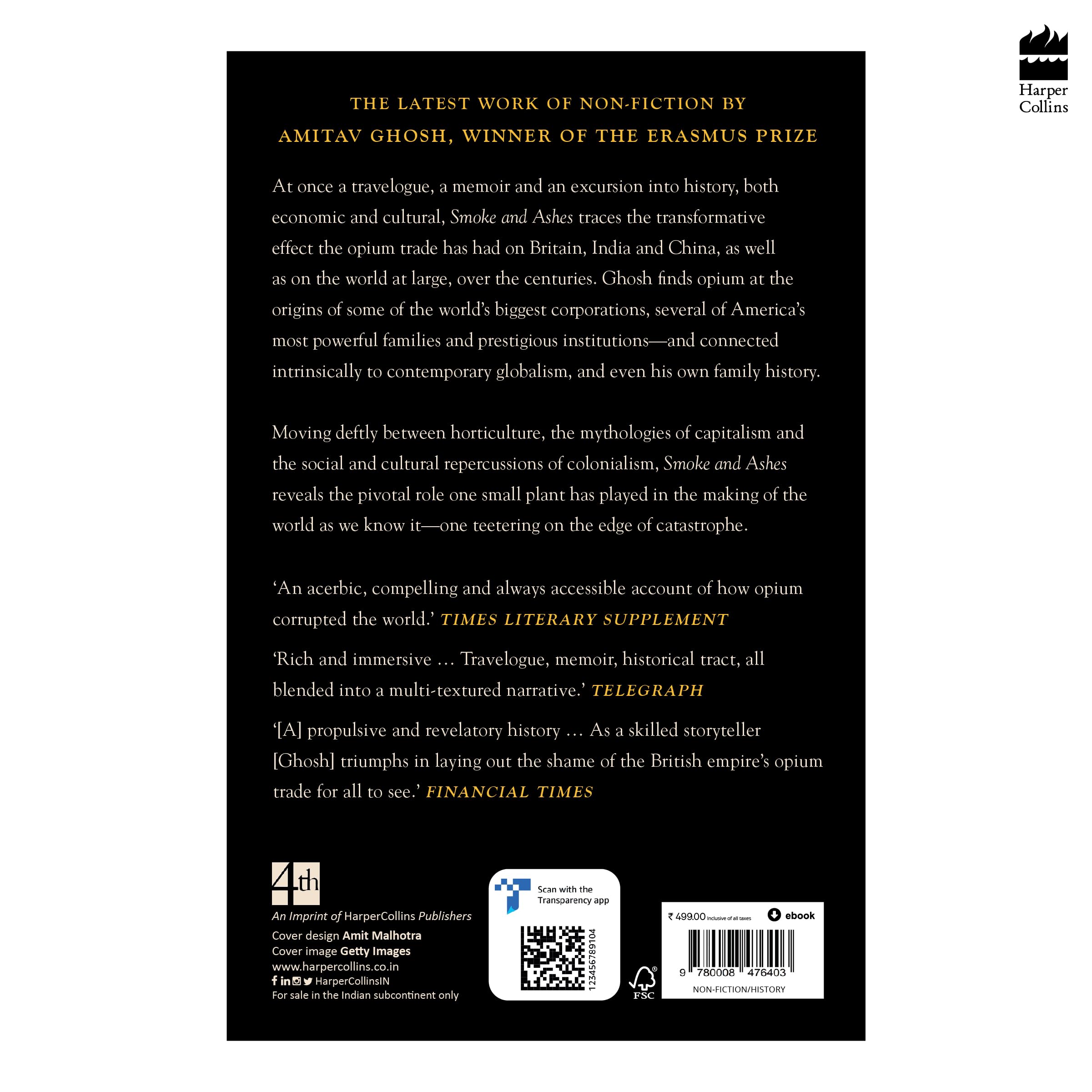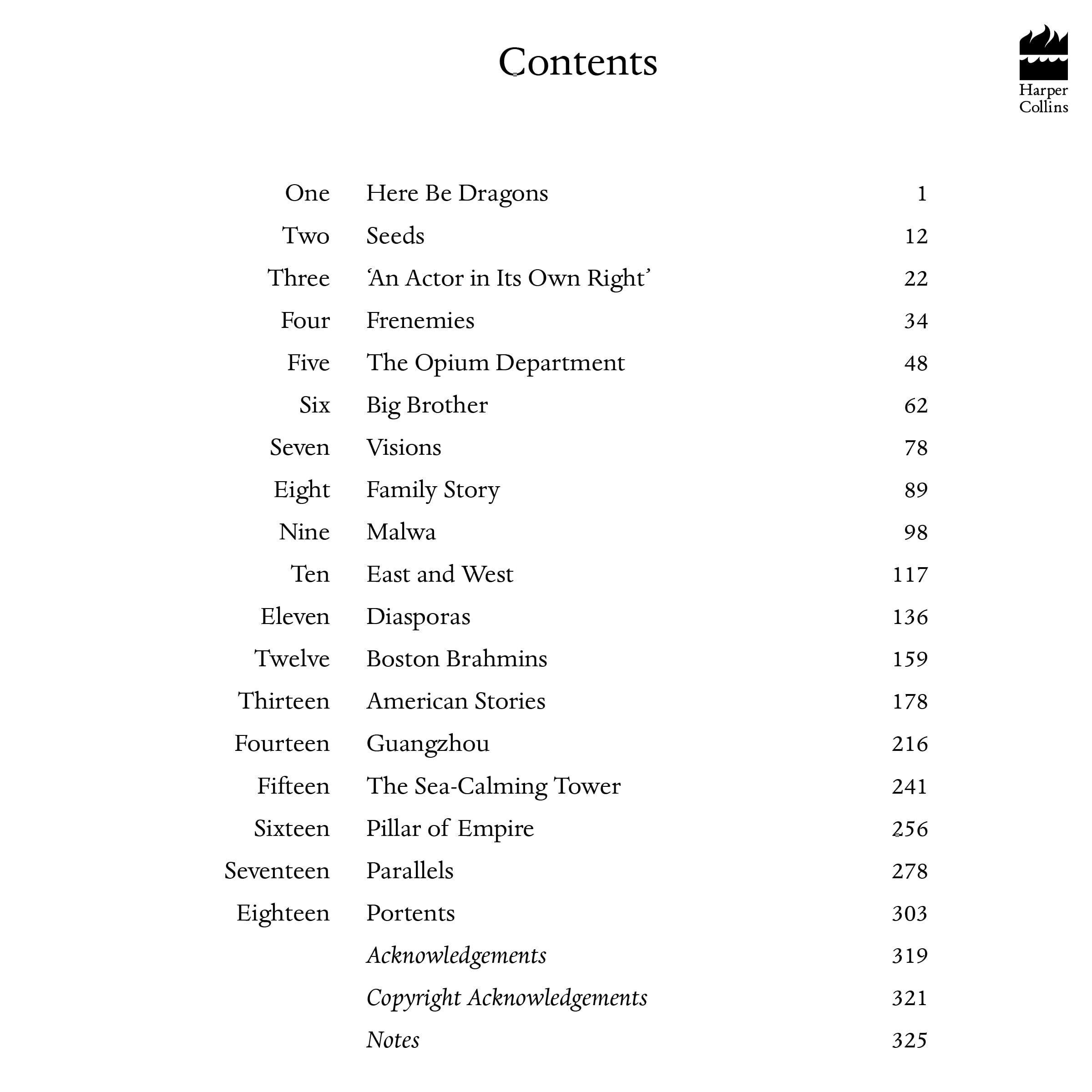معلومات عنا
دعم العملاء
احصل على التطبيق

قم بتوجيه الكاميرا لتنزيل التطبيق
حقوق الطبع والنشر © 2024 Desertcart Holdings Limited





Full description not available




S**Y
Poppies made them do it! 😀
Amitav Ghosh is a unique writer, equally adept at both fiction and non-fiction. To my mind, his non-fiction travelogue kind writing is the best - In an Ancient Land (about Egypt and India) is one of my favourites.‘Smoke and Ashes’ is a kind of post-writing analysis, generated by the Ibis trilogy (Sea of Poppies series). I personally found the Ibis trilogy extremely important, but also full of crude language and situations, which completely put me off. I therefore stopped after reading the first one. This non-fiction book helps fill the void.It describes how the British colonial empire was built on tea and poppies. It goes into mesmerising details of the misery, the trickery, the deceit, the rapaciousness, the amorality of the colonial British and Dutch colonialists and the fortunes that they reaped for their misdeeds. It also points out how these colonialists reconstructed history and manipulated global perceptions to ensure that we know as little about this as we indeed do.Just one illustration might suffice: it is often said that the British triggered the Bengal famines in India due to their tinkering with the landholding and revenue collection systems. Amitava Ghosh helps us understand exactly how. The British forced hundreds of thousands of acres to be sown with opium, instead of paddy. The famine caused by this in 1770 led to 10 million or one crore deaths in what was known as Golden Bengal. And that wasn’t just it. The farmers were forced to cultivate opium because they would not do it willingly as the British paid extremely low prices, which did not even cover the direct cost of production. This impoverished the farmers further, and often forced them to divert opium to open market - which led to further repression and the canard of the thieving Asians.Amitava Ghosh is merciless and relentless in his indictment of the British in particular and the West in general. However, for some strange reason the book argues that the British did not do all this willingly - they were manipulated by the poppy plant, which has plans of world domination!Is this Amitava Ghosh trying to sweeten the bitter pill of Smoke and Ashes? Or is this a real argument? I’m reading on to find out. You should too.In terms of the physical book, the hardcover edition is printed and bound nicely. Typeface is pleasing. The price is a real steal. There are extensive footnotes and a bibliography. The only thing which I dearly miss is an index. That would have been wonderful.
C**E
CANTONISM
The book aligns with the tradition of exposing the original venality and moral treachery of the West. Edward Said's Orientalism indicted the West for denigrating the Orient, and Amitav Ghosh's Cantonism further indicted the West while exonerating the Orient from the common Western understanding that it is inherently corrupt with a propensity for disorderly living habits. Intoxication represents one such Eastern indiscipline.Ghosh shifts the narrative by arguing that the Canton lifestyle has long influenced Western households. On page 240, he writes, "the process of acculturation that is called 'Westernization' should be termed 'Cantonization.'"Through this non-fiction work, Ghosh establishes and concludes the facts woven throughout the fiction of the Ibis trilogy. It establishes that a significant portion of British revenue and the wealth of many American business houses were built on the ASHES of the Indians (chief exporters of opium) and Chinese (the chief importers of opium). The dividends and damage of that exploitation persist to this day, although they are denied or concealed. Nevertheless, the evident SMOKE still floats in the air.The book also argues for the independent power of opium, a keystone commodity, akin to what is often argued for Artificial Intelligence. Once unleashed, opium creates its own destiny—an entity with dual edges, both a medicine and a poison, depending on how it is used.Not every argument is convincing though, as Ghosh indicts the West, yet he mentions the venality of the ruling caste and class of Indians as an epiphenomenon to colonial rule. The Indigenous moral treachery seems excusable. Purvanchal, a prime focus area of the book, was under the Permanent Land Settlement System. Local landlords became agents of the East India Co. and later the Crown, brutally maintaining their feudal hold through the existing caste structure to subjugate the subaltern peasantry and labourers. For instance, it was Santhalis working under Bengali Nobobs in the tea gardens of Assam and not the other way around.Ghosh highlights several famous and infamous American and European names who benefited from the opium trade in the past and passed the benefits to their descendants. However, he misses giving a similar list of Indians and their descendants in the area between Purvanchal and Kolkata, where land control under Indigo and Opium (north of Ganga) and Coal (south of Ganga) was effectively with landlords and Indian businessmen belonging to certain castes and classes. They too passed on the benefits to their descendants as the promised land reforms and socialism was systematically scuttled.Barring some general evasive mentioning, wherever he mentions Indians involvemen, for example Parsis in western India and Marwaris in the east, the two dominant Indian communities in the trade, he profusely praises entrepreneurial qualities of the Marwadis and Parsis to balance it out. Praises were also showered individually. Similar generosity and nonchalance was not shown to the West.Ghosh further makes an argument similar to Nehru's 'Discovery of India,' asserting that the extent of underdevelopment in an area was proportional to the extent of colonial rule. Ghosh adds a Heroin, or villain in the form of opium to make the story more appealing—a common trope invoked by both liberal and conservative Indians of similar ascriptive identity, to lay blame on colonial rule and wash off any culpability of their caste and class.Nevertheless, the indigenous oppressive structure continues to exploit, although the keystone commodity keeps changing. For instance, Jharkhand's resource exploitation turns the state into a mere colony of social elites of Bihar and Bengal, with the largest corporations based not in Bombay but in Mumbai. While the ruling caste, class, or company always has someone to blame.The East India Company and other European traders used and accentuated the existing structure of oppression to their advantage. Opium, Indigo, Tea, and Coal are incidental only in making things worse.For the most part, the elevated role of opium accorded by 'Smoke and Ashes' is fascinating to comprehend. Ghosh, typical of his style, turns it mystical, and a portion of non-fiction turns into fiction. Clearly, opium stains and smears the faces of everyone who comes in contact with it, directly or indirectly. Alas, Cantonism of Ghosh only sees the stains and smeared faces in the West!
ترست بايلوت
منذ 3 أسابيع
منذ يومين